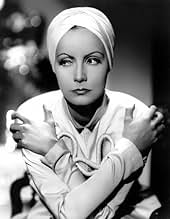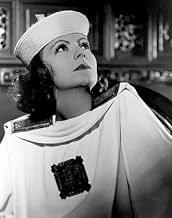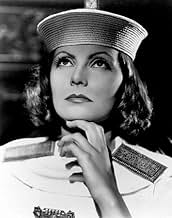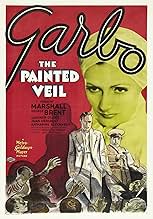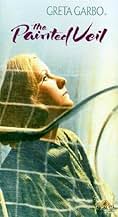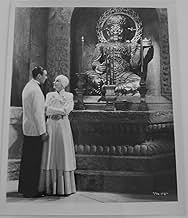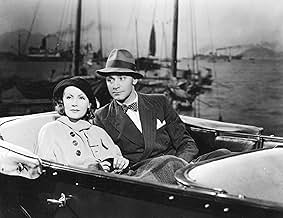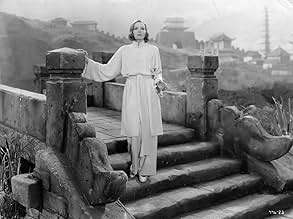IMDb रेटिंग
6.5/10
1.8 हज़ार
आपकी रेटिंग
अपनी भाषा में प्लॉट जोड़ेंA wife neglected by her husband, a medical researcher in China, falls in love with a dashing diplomatic attaché.A wife neglected by her husband, a medical researcher in China, falls in love with a dashing diplomatic attaché.A wife neglected by her husband, a medical researcher in China, falls in love with a dashing diplomatic attaché.
- पुरस्कार
- कुल 2 जीत
Robert Adair
- Polo Player
- (काटे गए सीन)
Mariska Aldrich
- German Teacher
- (काटे गए सीन)
Maidena Armstrong
- German
- (काटे गए सीन)
Billy Bevan
- Bridegroom
- (काटे गए सीन)
Beulah Bondi
- Frau Koerber
- (काटे गए सीन)
W.H. Davis
- German
- (काटे गए सीन)
Vernon Dent
- Chief of Police
- (काटे गए सीन)
फ़ीचर्ड समीक्षाएं
The future looked a little uncertain for Greta Garbo in 1934. Under pressure from the rampant, crackpot Catholic League of Decency whose members were boycotting movie theatres and declaring 'purify or destroy Hollywood', the usually malleable Joseph Breen was obliged to make even stricter the Production Code. 'Mata Hari' was cut and 'Queen Christina' taken out of circulation whilst this adaptation of Somerset Maugham's 'The Painted Veil' needed to tone down its so-called sexual content and instead reflect moral values.
These factors alone cannot entirely explain why this film disappoints. Garbo's scenes with Herbert Marshall are excellent and there is a chemistry between her and George Brent owing to their relationship at the time being more than just professional. It just lacks that 'alchemy' by which everything comes together and falls below director Richard Boleslawski's usual high standards.
Garbo need not have worried as David 0. Selznick was soon to come to her aid. Whatever its flaws and despite being the least faithful to Maugham's original it remains, for this viewer at any rate, the most entertaining of the three versions. 'The Seventh Sin' of Ronald Neame and an uncredited Vincente Minnelli is rather lacklustre whilst it is probably kinder to draw a discreet veil over the most recent version directed by someone named John Curran.
These factors alone cannot entirely explain why this film disappoints. Garbo's scenes with Herbert Marshall are excellent and there is a chemistry between her and George Brent owing to their relationship at the time being more than just professional. It just lacks that 'alchemy' by which everything comes together and falls below director Richard Boleslawski's usual high standards.
Garbo need not have worried as David 0. Selznick was soon to come to her aid. Whatever its flaws and despite being the least faithful to Maugham's original it remains, for this viewer at any rate, the most entertaining of the three versions. 'The Seventh Sin' of Ronald Neame and an uncredited Vincente Minnelli is rather lacklustre whilst it is probably kinder to draw a discreet veil over the most recent version directed by someone named John Curran.
GARBO...the five-letter name, synonymous with glamour and mystery, fills the screen and overwhelms the film's title and the rest of the cast. The legendary actress, Greta Garbo, warranted the outsize billing, and her glowing image dominates this romantic triangle based on a novel by W. Somerset Maugham. Dr. Walter Fane is a research assistant in Austria, and he harbors romantic intentions for Katrin, the daughter of his superior. Summoning the courage to propose, Fane quickly weds Katrin, and the pair head to China, where Fane's friend, Jack Townsend from the British embassy, aggressively courts the often neglected Katrin. Further complications ensue when a cholera epidemic breaks out, and Fane insists that Katrin accompany him further into the Chinese interior, where she will be separated from Townsend, and he will fight the disease.
As Katrin, Garbo is luminescent. No surprise as to why, because she was photographed by William H. Daniels, who lensed 21 Garbo films, and was garbed by Adrian, who dressed her in some of her greatest roles. The screen goddess, a moniker the actress richly merits, is flawless in dress or image, whether profile or three-quarter view, close-up or full figure. When she quickly wraps a white scarf around her hair to go out, she emerges as pure elegance in full length white attire. Displaying all the mannerisms that her audience adored, from the fluttering eyelids and raised eyebrows to the subtle trembling of her mouth, Garbo is reason enough to see "The Painted Veil." Whether watching a Chinese pageant that resembles an act from the Ziegfeld Follies or running through streets filled with panicked Chinese, Garbo's makeup is pristine, her clothing spotless, and her air poised. The term "star" was coined for a screen presence such as hers.
Not surprisingly, Garbo's two male co-stars in the film pale in comparison. While neither Herbert Marshall nor George Brent were particularly memorable actors, they were often paired with strong actresses like Garbo or Bette Davis that unfairly cast them into the shadows. However, both Marshall and Brent were skilled and acquit themselves well here, although cognizant that audiences were there to see Garbo and not them. Whatever merits the Maugham novel possesses, the film's brief 85-minute running time is rushed, and motivations are not particularly convincing. The Marshall-Garbo marriage seems arbitrary and loveless from the start, and Townsend's pursuit of his friend's wife is a cold-hearted stab in the back. However, audiences did not come to analyze the characters or the plot, they came to see Garbo, and she gloriously commands attention in "The Painted Veil."
As Katrin, Garbo is luminescent. No surprise as to why, because she was photographed by William H. Daniels, who lensed 21 Garbo films, and was garbed by Adrian, who dressed her in some of her greatest roles. The screen goddess, a moniker the actress richly merits, is flawless in dress or image, whether profile or three-quarter view, close-up or full figure. When she quickly wraps a white scarf around her hair to go out, she emerges as pure elegance in full length white attire. Displaying all the mannerisms that her audience adored, from the fluttering eyelids and raised eyebrows to the subtle trembling of her mouth, Garbo is reason enough to see "The Painted Veil." Whether watching a Chinese pageant that resembles an act from the Ziegfeld Follies or running through streets filled with panicked Chinese, Garbo's makeup is pristine, her clothing spotless, and her air poised. The term "star" was coined for a screen presence such as hers.
Not surprisingly, Garbo's two male co-stars in the film pale in comparison. While neither Herbert Marshall nor George Brent were particularly memorable actors, they were often paired with strong actresses like Garbo or Bette Davis that unfairly cast them into the shadows. However, both Marshall and Brent were skilled and acquit themselves well here, although cognizant that audiences were there to see Garbo and not them. Whatever merits the Maugham novel possesses, the film's brief 85-minute running time is rushed, and motivations are not particularly convincing. The Marshall-Garbo marriage seems arbitrary and loveless from the start, and Townsend's pursuit of his friend's wife is a cold-hearted stab in the back. However, audiences did not come to analyze the characters or the plot, they came to see Garbo, and she gloriously commands attention in "The Painted Veil."
Based on a book by W. Somerset Maugham of the same name, The Painted Veil tells the tale of Katrin Koerber (Greta Garbo) who is lonely after her sister's marriage, with whom she was very close. She agrees to marry her father's research associate Dr. Walter Fane (Herbert Marshall) who takes her to China. However, he is deeply involved with his work and often neglects Katrin in favour of his work which leads her to seek love and attention from another man: Jack Townsend (George Brent).
Although I have been unsure of Garbo's acting abilities at times, she does well and truly shine in the role of the unfaithful and confused wife - a complex character which she masters with ease. Herbert Marshall does a good job of her husband caught between emotions and George Brent not a terribly good looking man was unconvincing as her lover. These two men seem to fade into the background when Garbo is on screen her exotic; cat like appearance really captures the audience despite not playing a glamorous character!
The scenery of old China is lavish and the costumes for Garbo are a pleasure to see. However, the divine Greta Garbo is the only thing that really makes The Painted Veil watchable. The plot is thin and weak but Garbo does a wonderful job and makes the melodramatic material believable and interesting. Not a great film, but watch it for Garbo.
Although I have been unsure of Garbo's acting abilities at times, she does well and truly shine in the role of the unfaithful and confused wife - a complex character which she masters with ease. Herbert Marshall does a good job of her husband caught between emotions and George Brent not a terribly good looking man was unconvincing as her lover. These two men seem to fade into the background when Garbo is on screen her exotic; cat like appearance really captures the audience despite not playing a glamorous character!
The scenery of old China is lavish and the costumes for Garbo are a pleasure to see. However, the divine Greta Garbo is the only thing that really makes The Painted Veil watchable. The plot is thin and weak but Garbo does a wonderful job and makes the melodramatic material believable and interesting. Not a great film, but watch it for Garbo.
This movie is imperfect, but I love it anyway.
Its imperfections:
The soundstage China of 1933's "Bitter Tea of General Yen" leaves the soundstage China of 1934's "Painted Veil" in the dust. "Yen's" China draws you in and intoxicates you. "Painted Veil's" China is fun, but it's a bit silly and superficial. A San Francisco Chinatown Chinese New Year's parade would be more profound.
George Brent is at his worst here. I've never seen him do anything quite like what he does here -- a fly-by-night and exploitative romancer who toys with women's hearts.
Brent wasn't great looking, but he was very good at playing the grounded, reliable foil to electric characters like Bette Davis' Judith Traherne in "Dark Victory."
Here, as Townsend, while speaking serious words, Brent adopts a silly smile, and -- literally -- renounces everything he says in the very next sentence. Maybe a much better looking, or more conventionally handsome, actor could have made this character charming in a snake-like, dangerous way (Erroll Flynn?) but Brent didn't really have the equipment to make Townsend as charming to the audience as he might have been to a neglected wife in China.
Garbo plays a near spinster who watches her younger sister marry, and, on the rebound, marries a man she doesn't love out of desperation.
How on earth could anyone make sense of *Garbo* as a desperate spinster? The movie doesn't even try to make sense of that. It just asks us to believe it. The viewer has to try to make up reasons for her spinster status. (Her parents kept her locked in a closet the first thirty or so years of her life? She had a horrible facial deformaty that suddenly fell off?)
BUT!
I still love this movie.
I love it for the moment when Herbert Marshall says, with the kind of real passion you expect of a contemporary production of a Eugene O'Neill play, that he despises himself for loving Garbo, after she has cuckolded him.
It's great to see Marshall, who so often played helpless men ill used by women ("The Letter," "Duel in the Sun," "The Little Foxes"), here finally able to effectively express his bitterness at being so ill used, and take some action in response, even if that action is intended to be fatal.
I love it for the complications that arise in the final portion. Hearts are changed. Suffering and human sacrifice changes them. Love is born of the kind of big events that sometimes do change people, and life stories, in real life.
This ending, though not in compliance with Maughm's novel, didn't strike me as a "Hollywood" "happy" ending at all. It struck me as a profound ending. It reminded me of a more recent film, Bertolucci's "Besieged," that also talks about the role of altruism in love and eroticism.
For those features, I deeply value this movie, in spite of its superficial imperfections.
Its imperfections:
The soundstage China of 1933's "Bitter Tea of General Yen" leaves the soundstage China of 1934's "Painted Veil" in the dust. "Yen's" China draws you in and intoxicates you. "Painted Veil's" China is fun, but it's a bit silly and superficial. A San Francisco Chinatown Chinese New Year's parade would be more profound.
George Brent is at his worst here. I've never seen him do anything quite like what he does here -- a fly-by-night and exploitative romancer who toys with women's hearts.
Brent wasn't great looking, but he was very good at playing the grounded, reliable foil to electric characters like Bette Davis' Judith Traherne in "Dark Victory."
Here, as Townsend, while speaking serious words, Brent adopts a silly smile, and -- literally -- renounces everything he says in the very next sentence. Maybe a much better looking, or more conventionally handsome, actor could have made this character charming in a snake-like, dangerous way (Erroll Flynn?) but Brent didn't really have the equipment to make Townsend as charming to the audience as he might have been to a neglected wife in China.
Garbo plays a near spinster who watches her younger sister marry, and, on the rebound, marries a man she doesn't love out of desperation.
How on earth could anyone make sense of *Garbo* as a desperate spinster? The movie doesn't even try to make sense of that. It just asks us to believe it. The viewer has to try to make up reasons for her spinster status. (Her parents kept her locked in a closet the first thirty or so years of her life? She had a horrible facial deformaty that suddenly fell off?)
BUT!
I still love this movie.
I love it for the moment when Herbert Marshall says, with the kind of real passion you expect of a contemporary production of a Eugene O'Neill play, that he despises himself for loving Garbo, after she has cuckolded him.
It's great to see Marshall, who so often played helpless men ill used by women ("The Letter," "Duel in the Sun," "The Little Foxes"), here finally able to effectively express his bitterness at being so ill used, and take some action in response, even if that action is intended to be fatal.
I love it for the complications that arise in the final portion. Hearts are changed. Suffering and human sacrifice changes them. Love is born of the kind of big events that sometimes do change people, and life stories, in real life.
This ending, though not in compliance with Maughm's novel, didn't strike me as a "Hollywood" "happy" ending at all. It struck me as a profound ending. It reminded me of a more recent film, Bertolucci's "Besieged," that also talks about the role of altruism in love and eroticism.
For those features, I deeply value this movie, in spite of its superficial imperfections.
The best adaptation of Maugham may be "The Letter," but this version of "The Painted Veil," which substantially changes his ending, is very nearly as good-- as subtle, as elegant, and as satisfying as a work of art. Both examine the profound differences and similarities that exist between passion and love, but this film goes deeper, looking at the glory that ensues when, at length, love and passion bloom together.
Much credit goes to William Daniels, who was D.P. for directors from Stroheim to Ichikawa to Bud Yorkin. His framing and silvery lighting give even greater weight to the superb performances by Garbo and the masterful Herbert Marshall. Together Daniels and director Boleslawski allow the two actors to deliver the very affecting and very adult dialog with rare dignity and feeling.
The two kitchen scenes in particular, one in the first sequence, and one near the end, are flawless, and all the better because of being parallels, and because the dialog employs the sheer force of elemental simplicity. In the second scene,when cholera-fighting Marshall finally speaks of his wife's infidelity, he humbly takes some of the blame, saying, "I went blind a little mad. But if all the men who were hurt simply quit — bad business." Garbo at last begins to understand and replies, "Being in love, and letting it smash things as I have, I thought it had the right of way, I really did." She finally realizes that passion, such as hers for her lover, can be both deeply felt and utterly shallow.
One more note about the visual genius on display. A standard cliché, fireworks,is used to suggest orgasm, but it is done as brilliantly and thrillingly as I've ever seen: three or four bursts of sparks shoot into the frame, like nothing so much as ejaculation.
Much credit goes to William Daniels, who was D.P. for directors from Stroheim to Ichikawa to Bud Yorkin. His framing and silvery lighting give even greater weight to the superb performances by Garbo and the masterful Herbert Marshall. Together Daniels and director Boleslawski allow the two actors to deliver the very affecting and very adult dialog with rare dignity and feeling.
The two kitchen scenes in particular, one in the first sequence, and one near the end, are flawless, and all the better because of being parallels, and because the dialog employs the sheer force of elemental simplicity. In the second scene,when cholera-fighting Marshall finally speaks of his wife's infidelity, he humbly takes some of the blame, saying, "I went blind a little mad. But if all the men who were hurt simply quit — bad business." Garbo at last begins to understand and replies, "Being in love, and letting it smash things as I have, I thought it had the right of way, I really did." She finally realizes that passion, such as hers for her lover, can be both deeply felt and utterly shallow.
One more note about the visual genius on display. A standard cliché, fireworks,is used to suggest orgasm, but it is done as brilliantly and thrillingly as I've ever seen: three or four bursts of sparks shoot into the frame, like nothing so much as ejaculation.
क्या आपको पता है
- ट्रिवियाQueen Christina (1933) and The Painted Veil (1934) were both huge hits in Europe (making twice their budget in the UK alone), but were underwhelming US successes.
- गूफ़A box is marked "Scotch Whiskey", which is the American spelling of whiskey. In the United Kingdom, however, it is spelled with no 'e' and is simply "whisky". Therefore, had the whisk(e)y been imported directly from Scotland, it should have had the 'whisky' spelling.
- भाव
Katrin Koerber Fane: [after Townsend impulsively kisses Katrin] How could you?
Jack Townsend: I could.
- क्रेज़ी क्रेडिटGreta Garbo's name in the opening credits uses a font that forms the same Gothic arch in the letters as is used in W. Somerset Maugham's symbol. The other credits also use this to a lesser extent.
- कनेक्शनFeatured in The Good Earth (1937)
- साउंडट्रैकBridal Chorus (Here Comes the Bride)
(1850) (uncredited)
from "Lohengrin"
Written by Richard Wagner
Played as background music in the wedding scene
टॉप पसंद
रेटिंग देने के लिए साइन-इन करें और वैयक्तिकृत सुझावों के लिए वॉचलिस्ट करें
- How long is The Painted Veil?Alexa द्वारा संचालित
विवरण
- रिलीज़ की तारीख़
- कंट्री ऑफ़ ओरिजिन
- भाषाएं
- इस रूप में भी जाना जाता है
- Bračna lomača
- फ़िल्माने की जगहें
- चीन(background shots)
- उत्पादन कंपनी
- IMDbPro पर और कंपनी क्रेडिट देखें
बॉक्स ऑफ़िस
- बजट
- $9,47,000(अनुमानित)
- चलने की अवधि
- 1 घं 25 मि(85 min)
- रंग
- पक्ष अनुपात
- 1.37 : 1
इस पेज में योगदान दें
किसी बदलाव का सुझाव दें या अनुपलब्ध कॉन्टेंट जोड़ें

